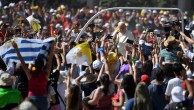Roughly three-in-ten Hispanics (28%) show high levels of religious commitment based on their frequency of prayer and worship service attendance, as well as the importance of religion in their lives. Evangelical Protestants exhibit higher levels of religious commitment than other major Hispanic religious groups, on par with white non-Hispanic evangelical Protestants and black non-Hispanic Protestants. Comparatively, Hispanics who are religiously unaffiliated report relatively low levels of worship attendance and prayer while assigning less importance to religion in their lives. Hispanic Catholics and mainline Protestants tend to fall somewhere in between evangelical Protestants and the unaffiliated on these measures.
Hispanic Catholics – both foreign born and U.S. born – are similar to white non-Hispanic Catholics in their levels of religious commitment.
Hispanic mainline Protestants, meanwhile, tend to exhibit higher levels of religious commitment than their white non-Hispanic counterparts on some measures. These differences are largely due to sharply higher levels of religious commitment among foreign-born Hispanic mainline Protestants. Religious commitment among U.S.-born Hispanic mainline Protestants is comparable to that of white mainline Protestants in the U.S. public as a whole.
Trends reported in this chapter come from the 2006 Pew Research Center survey of Hispanics and religion and a subsequent call-back survey of Hispanic Catholics conducted in 2007. See Appendix A: Survey Methodology for more detail.
Importance of Religion
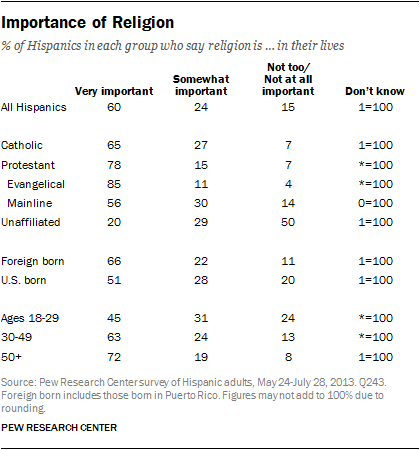
Six-in-ten Latinos say that religion is very important in their lives, while a quarter (24%) say it is somewhat important and 15% say it is not too or not at all important. By comparison, 56% of Americans overall say that religion is very important in their lives.
Latino evangelical Protestants are especially likely to consider religion very important in their lives; fully 85% express this view. About two-thirds of Latino Catholics (65%) say religion is very important to them, as do a majority of Latino mainline Protestants (56%). Just one-in-five Latinos who are unaffiliated with a religion say that religion is very important to them, while fully half say that it is not too or not at all important.
Older Hispanics are more likely than their younger counterparts to say that religion is very important in their lives. And Hispanic immigrants are more likely than those who were born in the U.S. to say religion is very important to them. This pattern holds true across age groups. For example, half (50%) of Hispanic immigrants ages 18-29 say that religion is very important in their lives, compared with 40% of U.S.-born Hispanics in the same age group.
Worship Service Attendance
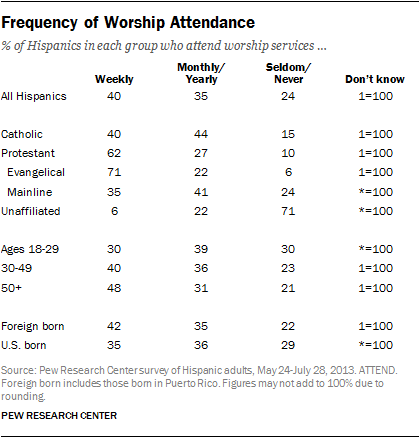
Four-in-ten Hispanics say they attend worship services at least once a week. Roughly a third (35%) say they attend services a few times a month or a few times a year, and about a quarter (24%) say they seldom or never attend. A similar share of the U.S. general public attends worship services at least weekly (37%).
Latino evangelical Protestants stand out from other religious groups on this measure. Seven-in-ten evangelicals (71%) say they attend worship services at least once a week, compared with 35% of Latino mainline Protestants and 40% of Latino Catholics. Just 6% of the religiously unaffiliated attend services at least weekly, while seven-in-ten (71%) say that they seldom or never attend worship services.
Older Hispanics attend worship services somewhat more regularly than younger Hispanics, a pattern also found among the general public. About half of Hispanics ages 50 and older say they attend services at least weekly (48%). By comparison, four-in-ten of those ages 30-49 and three-in-ten adults under age 30 attend services at least weekly. There are no significant differences by nativity in frequency of worship service attendance after controlling for age.
Daily Prayer
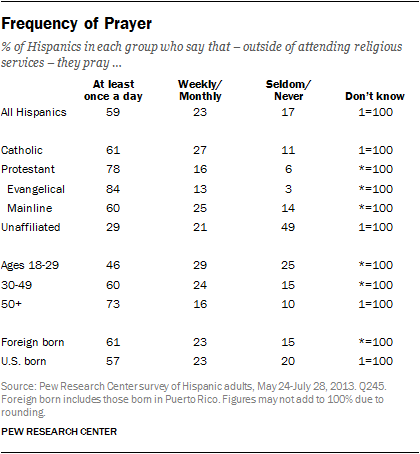
About six-in-ten Hispanics (59%) say they pray at least once a day outside of attending worship services. Roughly a quarter (23%) say they pray weekly or monthly, and 17% say they seldom or never pray outside of religious services. In the general public overall, 55% say they pray daily.
Similar shares of Hispanic Catholics (61%) and mainline Protestants (60%) engage in prayer on a daily basis; the figure is much higher for Hispanic evangelical Protestants (84%). Roughly three-in-ten Hispanics with no religious affiliation (29%) say they pray daily; about a fifth (21%) say they pray weekly or monthly, and about half (49%) say they seldom or never pray.
As with other measures of religious commitment, daily prayer is more common among older Hispanics than among younger ones. Nearly three-quarters of Hispanics ages 50 and older pray daily (73%); by comparison, six-in-ten of those ages 30-49 and 46% of those ages 18-29 pray at least once a day. After controlling for age, there are no significant differences by nativity in frequency of prayer.
Index of Religious Commitment
When these three measures of religiosity – the importance of religion, frequency of worship service attendance and frequency of prayer outside of worship services – are combined, they provide a useful indicator of overall religious commitment among Latinos. By this combined measure, about three-in-ten Latinos (28%) have a “high” level of religious commitment, saying that religion is very important in their lives, that they attend services at least once a week and that they pray every day. Just 7% exhibit “low” levels of commitment, saying that religion is either “not too” or “not at all” important to them, that they seldom or never attend worship services and that they seldom or never pray. A majority of Latinos (63%) fall somewhere in between, exhibiting a “medium” level of religious commitment. Latinos are about as likely as Americans overall to exhibit a high level of religious commitment (28% vs. 29% among the general public). However, a somewhat smaller share of Latinos exhibit a low level of religious commitment (7% vs. 11% among the general public).
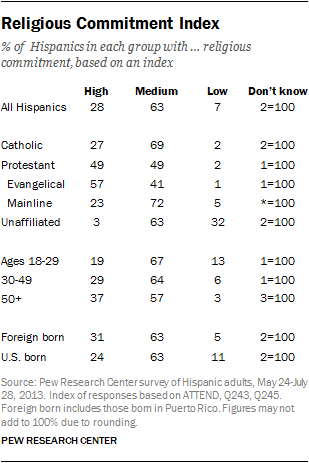
Latino Catholics and mainline Protestants are similar on this index of religious commitment, with 27% and 23%, respectively, falling into the high-commitment category. A much larger share of Latino evangelical Protestants (57%) exhibit a high level of commitment.
Just 3% of religiously unaffiliated Latinos have a high degree of religious commitment according to the index. A majority of the religiously unaffiliated (63%) exhibit a medium level of religious commitment, while about a third (32%) fall into the low-commitment category.
Older Latinos have a higher level of religious commitment than do younger Latinos. Nearly four-in-ten Latinos ages 50 and older (37%) show a high level of commitment on this index, compared with about three-in-ten (29%) of those ages 30-49 and 19% of adults under age 30.
Latino immigrants are somewhat more likely than U.S.-born Latinos to have a high level of religious commitment on this index. However, this gap stems primarily from differences between native-born and foreign-born mainline Protestants. In addition, differences by nativity are not significant after controlling for age.
Other Indicators of Religious Commitment
Engagement in Congregational Life and Volunteering
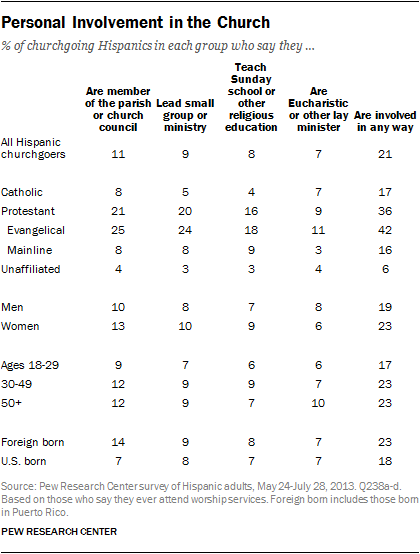
One-in-five Hispanics who say they ever attend worship services (21%) are involved in their church or place of worship in some way other than attending worship services. This includes 11% who say they are members of the parish or church council, 9% who lead small groups or ministries, 8% who teach Sunday school or other religious education and 7% who are Eucharistic or lay ministers.
Churchgoing Hispanic evangelical Protestants have a rate of involvement in church activities that is more than twice as high as it is among other Hispanic religious groups. Four-in-ten evangelical Protestants (42%) say they are involved in church ministries in some way, compared with 17% of Catholics, 16% of mainline Protestants and 6% of those who are unaffiliated with a religion but still attend worship services on occasion.
In terms of individual activities, churchgoing Hispanic evangelical Protestants are about three times as likely as Hispanic mainline Protestants or Hispanic Catholics to be members of a parish or church council. They also are three times as likely as mainline Protestants – and more than four times as likely as Catholics – to lead small groups or ministries. When it comes to teaching Sunday school or other forms of religious education, evangelicals (18%) are twice as likely as mainline Protestants (9%) to be involved. Far fewer Catholics (4%) or religiously unaffiliated Hispanics (3%) say they teach Sunday school.
Hispanics who were born outside the U.S. are a bit more likely than U.S.-born Hispanics to be involved in their church in some way (23% vs. 18%). In particular, the foreign born are more likely to be on a parish or church council; 14% of foreign-born Hispanics say they are, compared with 7% of the native born. This pattern may be related, in part, to the older average age of immigrants relative to native-born Hispanics.
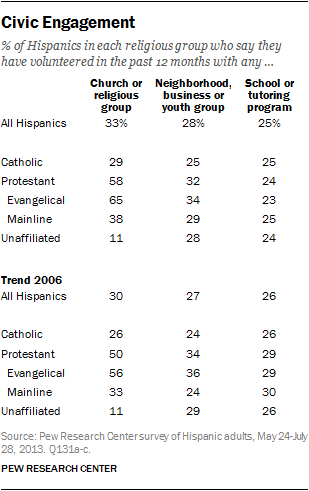
Women are somewhat more likely than men to be involved in the church in some way (23% vs. 19%), and Hispanics ages 30 and older (23%) are more likely than those ages 18-29 (17%) to be involved.
A third of all Hispanics (33%) report they have volunteered with a church or religious group in the past 12 months, and 28% say they have volunteered with a neighborhood group, business group or youth group. A quarter of Hispanics (25%) say they have volunteered at a school or tutoring program.
The level of engagement in these activities among Hispanics overall is largely unchanged from 2006, when three-in-ten said they volunteered with a church or religious group, 27% said they were involved with a neighborhood group and 26% helped with a school or tutoring program. Hispanic evangelical Protestants are somewhat more likely to say they have volunteered with a church or religious group (65%, vs. 56% in 2006).
Hispanic evangelical Protestants stand out in terms of volunteering with a church or religious group; nearly two-thirds (65%) say they have done this in the past 12 months, while fewer than half of mainline Protestants (38%) and Catholics (29%) say the same. But evangelicals are about as likely as members of other religious groups to say they volunteer in neighborhood or school groups.
Reading Scripture
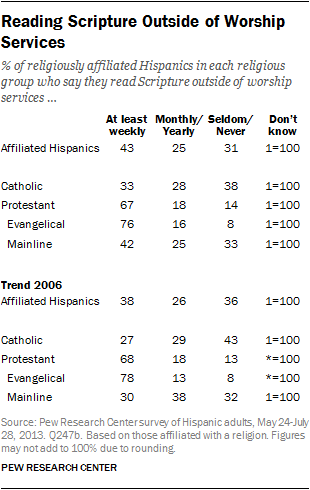
A plurality of Hispanics who are affiliated with a religion (43%) say they read Scripture at least once a week outside of worship services. A quarter say they do this a few times a month or a few times a year, and 31% say they seldom or never read Scripture outside of worship services.
Among Hispanic religious groups, Protestants are twice as likely as Catholics to read Scripture regularly outside of worship services (67% vs. 33%). Evangelical Protestants are especially likely to read Scripture outside of services, with fully three-quarters (76%) saying they do this weekly or more often, compared with 42% of mainline Protestants.
There has been a slight uptick in the percentage of religiously affiliated Hispanics who read Scripture outside of worship. In 2006, 38% said they did this weekly or more; in 2013, 43% say the same. The change has occurred primarily among Catholics, a third of whom read Scripture outside of worship at least weekly (33%), up from 27% in 2006.
Participation in Bible Study Groups
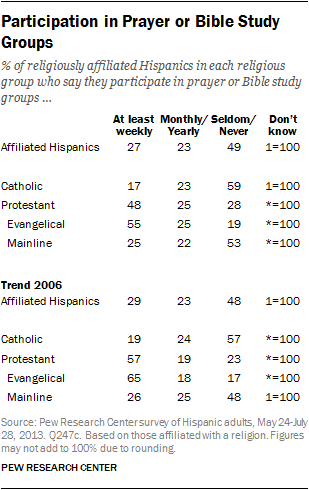
Roughly a quarter (27%) of Hispanics who are affiliated with a religion say they participate in prayer groups or Bible study groups at least once a week. A similar portion (23%) say they participate monthly or yearly, while about half (49%) say they seldom or never participate.
About half of Latino evangelical Protestants (55%) participate in Bible study groups at least once a week. This level of participation is less common among Catholics and mainline Protestants. Fewer than one-in-five Catholics (17%) say they participate in prayer or Bible study groups on a weekly basis, and about a quarter (23%) say they do so a few times a month or a few times a year. A quarter of mainline Protestants participate in such groups at least weekly, and a similar portion (22%) participate monthly or yearly.
Among Latinos overall, participation in prayer groups or Bible study groups has remained stable since 2006. Among Latino evangelical Protestants, though, the share saying they participate in such groups on a weekly basis has declined somewhat, from 65% in 2006 to 55% in 2013.
Sharing the Faith
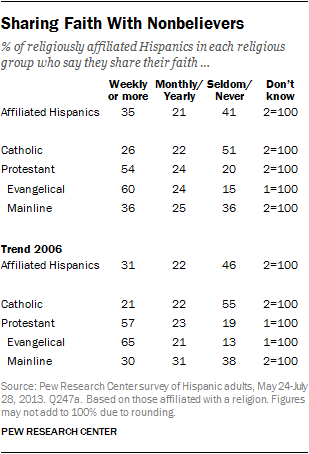
Roughly a third (35%) of Hispanics who are affiliated with a religion say they share their faith with nonbelievers at least once a week. About one-in-five (21%) say they share their faith monthly or yearly, and four-in-ten (41%) say they seldom or never share their faith with nonbelievers.
Among religious groups, Latino Protestants are more likely to share their faith on a regular basis than are Catholics (54% vs. 26%). And among Protestants, evangelicals are far more likely than mainline Protestants to say they share their religion weekly or more (60% vs. 36%). About half of Latino Catholics (51%) say they seldom or never share their faith with nonbelievers, compared with 20% of Protestants who say the same. These figures are largely unchanged from 2006.
Catholics and Praying to Saints

Nearly half of Hispanics (47%), including seven-in-ten Catholics (70%), say they pray to saints to ask for help when they face difficult moments in their lives. In addition, about three-in-ten Hispanics overall (28%), and 39% of Hispanic Catholics, say they have made offerings to spiritual beings or saints. These practices may reflect both official Catholic practices and indigenous or Afro-Caribbean religious traditions. For more on indigenous practices, see Chapter 8.
The Pew Research survey asked respondents whether or not they pray to saints, and then asked a separate question about whether they ever pray to “popular or folk saints.” The most common responses to both questions were traditional Catholic saints, such as the Virgin Mary and Saint Jude. As a result, responses to the two questions are combined here.
Not surprisingly, praying to saints is a far more common practice among Catholics than among other religious groups. Fully seven-in-ten Hispanic Catholics say they pray to saints, compared with 23% of mainline Protestants, 21% of the unaffiliated and 9% of evangelical Protestants.
Among Catholics, those who attend Mass at least once a week are slightly more likely to say they pray to saints (74%) than are Catholics who attend Mass less often (67%).
Praying to saints also is somewhat more common among Catholic immigrants (74%) than among U.S.-born Catholics (63%). There are few differences on this measure among Latino Catholics of different origin groups.

When asked to whom they pray most often, Hispanic Catholics reference Mary as their most common response. About one-in-six say they pray most often to Our Lady of Guadalupe (17%), and about as many say the Virgin Mary (16%). Saint Jude is mentioned by 13% of Hispanic Catholics. Fewer than one-in-ten say they pray most often to God (7%) and to Jesus Christ (7%).
The Pew Research survey specifically asked about any “popular or folk saints” to whom people might direct their prayers, but very few Catholics – less than 1% – mention folk saints who are not officially recognized by the Catholic Church, such as La Santa Muerte or Jesús Malverde. Similarly, very few respondents – also less than 1% – mentioned figures from other religions, such as Orishas (spirits associated with Santería).
Catholics and Confession
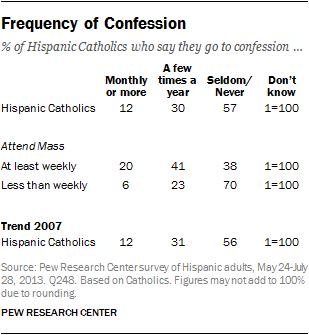
Three-in-ten Latino Catholics say they go to confession a few times a year, and 12% say they do so at least monthly. A majority (57%), however, say they seldom or never go to confession.
Among Latino Catholics who attend Mass at least once a week, about four-in-ten (41%) go to confession a few times a year, and a fifth (20%) go at least monthly. By comparison, among Latino Catholics who attend Mass less than once a week, 23% say they go to confession a few times a year and 6% go more often.
There are no major differences by age, gender or nativity in terms of frequency of attending confession.
There has been virtually no change in frequency of confession among Latino Catholics since 2007.
How Hispanics Compare With Non-Hispanics in Each Religious Group
Catholics
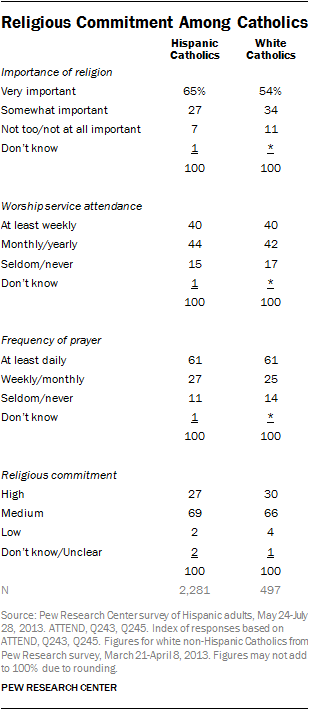
Overall, Hispanic Catholics closely resemble white non-Hispanic Catholics when it comes to levels of religious commitment. Among each group, four-in-ten attend Mass at least once a week, and about six-in-ten (61%) pray at least once a day. Roughly two-thirds of Hispanic Catholics (65%) say that religion is very important in their lives, while about half of white Catholics (54%) say the same. When the three measures are combined in an index of religious commitment, majorities of both Hispanic Catholics and white Catholics fall in the “moderate” category.
As noted earlier, fully 95% of Hispanic Catholics were raised Catholic. A 2012 Pew Research survey found that 88% of white Catholics were raised Catholic.17
Protestants
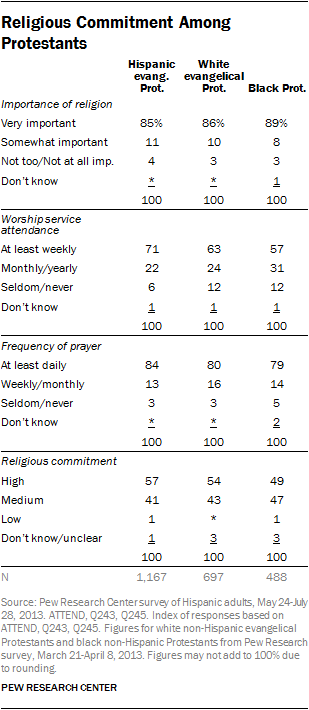
Hispanic evangelical Protestants stand out among Hispanic religious groups for their high levels of religious commitment. But, overall, the level of religious commitment among Hispanic evangelicals is similar to that of white (non-Hispanic) evangelical Protestants. It also is on par with the commitment level of black Protestants, about three-quarters of whom identify themselves as “evangelical or born-again.”
On some of these measures, Hispanic mainline Protestants tend to exhibit higher levels of religious commitment than do white mainline Protestants. However, there are sizable differences by nativity among this group. U.S.-born Hispanic mainline Protestants resemble white non-Hispanic mainline Protestants in their levels of religious commitment, while the foreign born exhibit markedly higher levels of commitment. For example, native-born mainline Protestants are about as likely as white (non-Hispanic) mainline Protestants to say that religion is very important in their lives (47% and 45%, respectively). By contrast, about seven-in-ten foreign-born Hispanic mainline Protestants (69%) say that religion is very important to them.
Similarly, Latino mainline Protestants are more likely than white mainline Protestants to report praying at least daily (60% vs. 45%). However, this difference is due largely to more frequent prayer among foreign-born mainline Protestants; roughly three-quarters of foreign-born mainline Protestants (74%) say they pray daily, compared with about half of the U.S. born (51%).
A much larger share of foreign-born Latino mainline Protestants report attending worship services at least once a week than do U.S.-born Latino mainline Protestants (59% vs. 18%). By comparison, about three-in-ten white mainline Protestants (29%) attend services at least once a week.
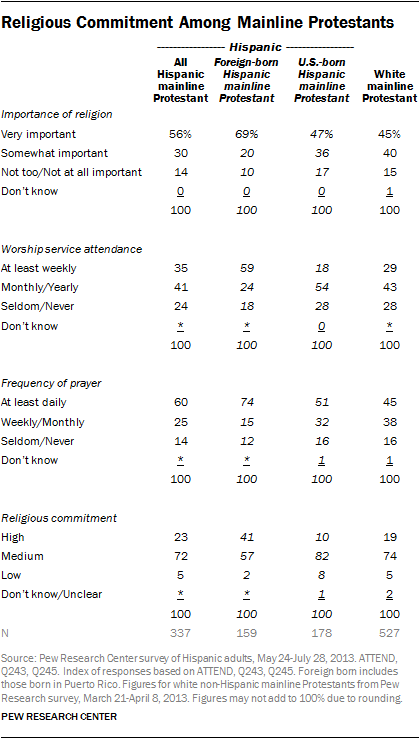
The Religiously Unaffiliated

Latinos who have no particular religion or say they are atheist or agnostic exhibit distinctly low levels of religious commitment compared with other Latino groups. But religiously unaffiliated Latinos are roughly similar to unaffiliated non-Hispanic whites in their frequency of worship service attendance, and they differ only modestly in their frequency of prayer and the importance of religion in their lives.
Nearly all religiously unaffiliated Hispanics and religiously unaffiliated non-Hispanic whites exhibit either medium or low levels of religious commitment. But the share of the unaffiliated with a medium level of religious commitment is higher among Hispanics (63%) than it is among non-Hispanic whites (50%), and a greater share of unaffiliated non-Hispanic whites have a low level of religious commitment compared with Hispanics (47% vs. 32%).
Spotlight on Latino Jehovah’s Witnesses

Jehovah’s Witnesses comprise approximately 1% of the U.S. adult population and 2% of Hispanics. Most Pew Research Center surveys of the general public have been unable to analyze Jehovah’s Witnesses separately from other Christians because of the small size of the group and the way that past surveys have asked about religious affiliation. This survey of Hispanics included 130 respondents who identified as Jehovah’s Witnesses, providing an opportunity for a more in-depth look at religious practices among the group.
Latino Jehovah’s Witnesses stand out for their very high levels of religious commitment. Nearly nine-in-ten (87%) pray daily outside of worship services, eight-in-ten attend worship services at least weekly and 89% consider religion to be very important in their lives. Nearly three-quarters (73%) of Latino Jehovah’s Witnesses exhibit high levels of religious commitment; the remainder exhibit medium levels of commitment. In fact, not a single survey respondent who identifies as a Jehovah’s Witness exhibits a low level of commitment according to this three-question index.
A large share of this group has switched from the religion in which they were raised to become a Jehovah’s Witness. Roughly a quarter (27%) of Latino Jehovah’s Witnesses were raised as Jehovah’s Witnesses; most of the rest were raised Catholic (43%), Protestant (10%) or unaffiliated (18%). The share of foreign-born Jehovah’s Witnesses (71%) is somewhat larger than among Hispanics overall (60%).

Latino Jehovah’s Witnesses also are distinctive in their high levels of religious practice outside of worship services. Nearly nine-in-ten (87%) say they read the Bible outside of services at least once a week. About eight-in-ten say they attend prayer groups or Bible study groups and share their faith with nonbelievers at least once a week (82% each).
About two-thirds of Latino Jehovah’s Witnesses (65%) say they have volunteered with a church or religious group in the past year. Significantly smaller shares have volunteered with a neighborhood group (29%) or school program (26%).

